6 july 2019
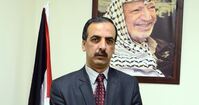
Ali al-Hayek, head of the Palestinian Businessmen Association, has called for necessarily lifting the Israeli ban on the entry of many raw materials and construction needs to the Gaza Strip on allegations they are dual-use goods.
In a press release, Hayek also stressed the need to end the UN-sponsored reconstruction mechanism in Gaza, known as “GRM,” saying such mechanism led to disastrous and destructive impacts on Gaza’s economy.
The GRM is a temporary agreement between the Palestinian Authority, Israel and the UN that went into effect after the 2014 aggression against Gaza.
The GRM sets out procedures supposedly to enable the entry of essential construction materials to Gaza, which is under Israeli blockade.
However, it has failed to enable large-scale construction and reconstruction in the coastal enclave.
Hayek underlined that the Gaza reconstruction mechanism (GRM) contributed to strengthening the siege on post-war Gaza, strangulating its economy and destroying the construction sector — the largest employer of workers — by restricting the entry of building materials needed to construct and reconstruct homes and infrastructure.
He also called for lifting Israel’s ban on the entry of more than 500 types of goods needed by the commercial and industrial sectors in Gaza
In a press release, Hayek also stressed the need to end the UN-sponsored reconstruction mechanism in Gaza, known as “GRM,” saying such mechanism led to disastrous and destructive impacts on Gaza’s economy.
The GRM is a temporary agreement between the Palestinian Authority, Israel and the UN that went into effect after the 2014 aggression against Gaza.
The GRM sets out procedures supposedly to enable the entry of essential construction materials to Gaza, which is under Israeli blockade.
However, it has failed to enable large-scale construction and reconstruction in the coastal enclave.
Hayek underlined that the Gaza reconstruction mechanism (GRM) contributed to strengthening the siege on post-war Gaza, strangulating its economy and destroying the construction sector — the largest employer of workers — by restricting the entry of building materials needed to construct and reconstruct homes and infrastructure.
He also called for lifting Israel’s ban on the entry of more than 500 types of goods needed by the commercial and industrial sectors in Gaza
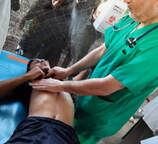
Thousands of protesters took part Friday, in the weekly Great March of Return, at Israel’s so-called security fence, bordering Gaza, according to Palestinian WAFA Agency.
According to medical sources, some of the injured being treated in field hospitals, while others had to be transferred to hospital for medical care.
According to the Palestinian Center for Human Rights, 95 people were injured by Israeli forces, including 33 children, 1 journalist, and 4 women, one of which was a volunteer medic
PCHR has documented that Israeli soldiers have killed 207 Palestinians, including 44 children, 2 women and 9 Palestinians with special needs, in addition to 4 medics and 2 journalists, since March 30th, 2018.
The PCHR added that the number of wounded Palestinians is 13053, including 2638 children, 398 women, 214 medics and 203 journalists.
The Great March of Return protests began on March 30, 2018, in which the nearly 2 million Palestinians in Gaza started asserting their right to return to their ancestral homes in pre-1948 Palestine, as well as calling for the complete lifting the illegal Israeli siege of Gaza.
According to Protocol 1 of the Geneva Convention, it is illegal to target civilians, which Israel has been doing since the outset of the demonstrations.
According to Article 11 of UN Resolution 194, the refugees living in Gaza have the right to return to the land they and their ancestors were forcefully evicted from in 1948, now called Israel.
According to medical sources, some of the injured being treated in field hospitals, while others had to be transferred to hospital for medical care.
According to the Palestinian Center for Human Rights, 95 people were injured by Israeli forces, including 33 children, 1 journalist, and 4 women, one of which was a volunteer medic
PCHR has documented that Israeli soldiers have killed 207 Palestinians, including 44 children, 2 women and 9 Palestinians with special needs, in addition to 4 medics and 2 journalists, since March 30th, 2018.
The PCHR added that the number of wounded Palestinians is 13053, including 2638 children, 398 women, 214 medics and 203 journalists.
The Great March of Return protests began on March 30, 2018, in which the nearly 2 million Palestinians in Gaza started asserting their right to return to their ancestral homes in pre-1948 Palestine, as well as calling for the complete lifting the illegal Israeli siege of Gaza.
According to Protocol 1 of the Geneva Convention, it is illegal to target civilians, which Israel has been doing since the outset of the demonstrations.
According to Article 11 of UN Resolution 194, the refugees living in Gaza have the right to return to the land they and their ancestors were forcefully evicted from in 1948, now called Israel.
4 july 2019
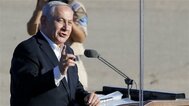
Israeli Prime Minister Benjamin Netanyahu has threatened a “large-scale” military offensive against the Gaza Strip.
Netanyahu claimed Wednesday that Israel wants to “restore calm,” but “same time we are preparing for a large-scale military operation, if such an action is required.”
“Those are my instructions to the army,” he added.
The hawkish premier made the remarks after a cabinet meeting to discuss the situation in the besieged coastal enclave. Netanyahu also held a meeting with local and regional council heads, some of whom left the meeting in protest.
“The prime minister had no intention of holding a special meeting on the Gaza envelope area as expected and as requested today,” they said.
The rockets fired from Gaza in response to frequent Israeli acts of aggression have turned into a major challenge for Netanyahu, who is grappling with corruption scandals and whose failure to form an administration has plunged the regime into unprecedented political chaos.
In May, Israeli warplanes struck hundreds sites in Gaza, killing scores of Palestinian people.
Israeli aerial raids on Gaza prompted the most intense fighting between the regime and the Palestinian resistance fighters since Tel Aviv’s bloody war on the blockaded enclave in 2014.
In retaliation, the Palestinian fighters fired around 700 rockets from Gaza into the occupied territories, killing four Israeli settlers and injuring at least 80 others.
Israeli media reported that Israel’s so-called Iron Dome missile system intercepted only 240 of the projectiles, adding that some 35 rockets and mortar shells had struck populated areas.
Gaza has been under Israeli siege since June 2007, which has caused a decline in living standards. Israel has launched three major wars against the enclave since 2008, killing thousands of Gazans and shattering the impoverished territory’s already poor infrastructure.
Netanyahu claimed Wednesday that Israel wants to “restore calm,” but “same time we are preparing for a large-scale military operation, if such an action is required.”
“Those are my instructions to the army,” he added.
The hawkish premier made the remarks after a cabinet meeting to discuss the situation in the besieged coastal enclave. Netanyahu also held a meeting with local and regional council heads, some of whom left the meeting in protest.
“The prime minister had no intention of holding a special meeting on the Gaza envelope area as expected and as requested today,” they said.
The rockets fired from Gaza in response to frequent Israeli acts of aggression have turned into a major challenge for Netanyahu, who is grappling with corruption scandals and whose failure to form an administration has plunged the regime into unprecedented political chaos.
In May, Israeli warplanes struck hundreds sites in Gaza, killing scores of Palestinian people.
Israeli aerial raids on Gaza prompted the most intense fighting between the regime and the Palestinian resistance fighters since Tel Aviv’s bloody war on the blockaded enclave in 2014.
In retaliation, the Palestinian fighters fired around 700 rockets from Gaza into the occupied territories, killing four Israeli settlers and injuring at least 80 others.
Israeli media reported that Israel’s so-called Iron Dome missile system intercepted only 240 of the projectiles, adding that some 35 rockets and mortar shells had struck populated areas.
Gaza has been under Israeli siege since June 2007, which has caused a decline in living standards. Israel has launched three major wars against the enclave since 2008, killing thousands of Gazans and shattering the impoverished territory’s already poor infrastructure.
1 july 2019

The Israeli occupation army on Monday morning launched a limited incursion into southern Gaza.
Local sources said that five military bulldozers in the early morning hours rolled a few hundred meters into Abasan town, east of the southern Gaza Strip city of Khan Yunis, and leveled Palestinian lands.
In the neighboring city of Rafah, the Israeli occupation forces opened fire at Palestinian farmers working in their border lands. No injuries were reported.
Meanwhile, the Israeli navy heavily opened fire at Palestinian fishing boats sailing off the shore of northern Gaza.
Local sources said that five military bulldozers in the early morning hours rolled a few hundred meters into Abasan town, east of the southern Gaza Strip city of Khan Yunis, and leveled Palestinian lands.
In the neighboring city of Rafah, the Israeli occupation forces opened fire at Palestinian farmers working in their border lands. No injuries were reported.
Meanwhile, the Israeli navy heavily opened fire at Palestinian fishing boats sailing off the shore of northern Gaza.
28 june 2019
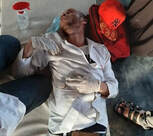
The Palestinian Center For Human Rights (PCHR): On Friday, 28 June 2019, in excessive use of force against peaceful protesters on the 64th Friday of the Great March of Return and Breaking the Siege, Israeli forces wounded 128 Palestinian civilians, including 38 children, 3 women, 7 paramedics, and a journalist. Four of those wounded sustained serious wounds.
According to observations by PCHR’s fieldworkers, the Israeli forces who stationed in prone positions and in military jeeps along the fence with Israel continued to use excessive force against the protesters by firing bullets and tear gas canisters at them.
As a result, dozens of the protesters were hit with bullets and teargas canisters without posing any imminent threat or danger to the life of soldiers.
On Friday, 28 June 2019, the incidents were as follows:
At approximately 16:30, thousands of civilians, including women, children and entire families, started swarming to the five encampments established by the Supreme National Authority of Great March of Return and Breaking the Siege adjacent to the border fence with Israel in eastern Gaza Strip cities.
Hundreds of protesters, including children and women, gathered adjacent to the border fence with Israel in front of each encampment and its vicinity tens and hundreds of meters away from the fence. The protesters chanted slogans, raised flags, and in very limited incidents attempted to approach the border fence and throw stones and Molotov Cocktails at the Israeli forces, who fired live and rubber bullets at them.
The Israeli shooting, which continued until 19:30, resulted in the injury of 128 Palestinian civilians, including 38 children, 3 women, 7 paramedics, and a journalist. Among those wounded, 41 were hit were hit with live bullets and shrapnel, 36 were hit with rubber bullets and 46 were directly hit with tear gas canisters. In addition, dozens of civilians suffered tear gas inhalation and seizures due to tear gas canisters that were fired by the Israeli forces from the military jeeps and riffles in the eastern Gaza Strip.
The following table shows the number of civilian casualties due to the Israeli forces’ suppression of the Great March of Return since its beginning on 30 March:
Killed Wounded
Total 207 12953
Children 44 2608
Women 2 392
Journalists 2 203
Medical personnel 4 217
Persons with disabilities 9 Undefined
Note: Among those wounded, 550 are in serious condition and 137 had their lower or upper limbs amputated; 123 lower-limb amputations, 14 upper-limb amputations, and 25 children had their limbs amputated according to the Ministry of Health. The number of those wounded only include those wounded with live bullets and directly hit with tear gas canisters, as there have been thousand others who suffered tear gas inhalation and sustained bruises.
PCHR reiterates Palestinians’ right to peaceful assembly to confront Israel and its forces’ denial of the legitimate and inalienable rights of the Palestinian people, including the right to self-determination, right to return and right to end the occupation of the Palestinian territory.
PCHR stresses that the Israeli forces should stop using excessive force and respond to the legitimate demands of the demonstrators, particularly lifting the closure which is the real solution to end the humanitarian crisis in the Gaza Strip.
PCHR reiterates the reported published in February by the UN Commission of Inquiry which emphasizes what came by PCHR and other Palestinian and international human rights organizations. The report at the time concluded that the Israeli violations may amount to war crimes and crimes against humanity.
PCHR emphasizes that continuously targeting civilians, who exercise their right to peaceful assembly or while carrying out their humanitarian duty, is a serious violation of the rules of international law, international humanitarian law, the ICC Rome Statute and Fourth Geneva Convention.
Thus, PCHR reiterates its call upon the ICC Prosecutor to open an official investigation in these crimes and to prosecute and hold accountable all those applying or involved in issuing orders within the Israeli Forces at the security and political echelons.
PCHR also emphasizes that the High Contracting Parties to the 1949 Fourth Geneva Convention should fulfill their obligation under Article 1; i.e., to respect and ensure respect for the Convention in all circumstances and their obligations under Article 146 to prosecute persons alleged to commit grave breaches of the Fourth Geneva Convention.
PCHR calls upon Switzerland, in its capacity as the Depository State for the Convention, to demand the High Contracting Parties to convene a meeting and ensure Israel’s respect for this Convention, noting that these grave breaches constitute war crimes under Article 147 of the same Convention and Protocol (I) Additional to the Geneva Conventions regarding the guarantee of Palestinian civilians’ right to protection in the occupied territories.
Public Document
**************************************
Follow PCHR on Facebook and Twitter
For more information please call PCHR office in Gaza, Gaza Strip, on +972 8 2824776 – 2825893
Gaza- Jamal ‘Abdel Nasser “al-Thalathini” Street – Al-Roya Building- Floor 12 , El Remal, PO Box 1328 Gaza, Gaza Strip. E-mail: [email protected], Webpage http://www.pchrgaza.org
Israeli forces injure 50 Palestinians in Gaza marches
Dozens of Palestinian citizens were injured by Israeli gunfire and tear gas bombs on the 64th Friday of the Great March of Return in the Gaza Strip.
The Ministry of Health said that 50 Palestinians were injured including 8 paramedics and a journalist.
Thousands of Palestinians took part in the Great March of Return along Gaza's eastern border in protest at the Bahrain conference.
The PIC reporters said that the Israeli forces heavily fired live ammunition and tear gas canisters at the peaceful protesters.
The Gaza Strip Palestinians on 30 March 2018 launched the Great March of Return to call for the return of refugees and demand an end to the 13-year-long blockade on the enclave.
Since the start of the border protests, the Israeli occupation forces have killed 318 demonstrators and injured over 31,000.
According to observations by PCHR’s fieldworkers, the Israeli forces who stationed in prone positions and in military jeeps along the fence with Israel continued to use excessive force against the protesters by firing bullets and tear gas canisters at them.
As a result, dozens of the protesters were hit with bullets and teargas canisters without posing any imminent threat or danger to the life of soldiers.
On Friday, 28 June 2019, the incidents were as follows:
At approximately 16:30, thousands of civilians, including women, children and entire families, started swarming to the five encampments established by the Supreme National Authority of Great March of Return and Breaking the Siege adjacent to the border fence with Israel in eastern Gaza Strip cities.
Hundreds of protesters, including children and women, gathered adjacent to the border fence with Israel in front of each encampment and its vicinity tens and hundreds of meters away from the fence. The protesters chanted slogans, raised flags, and in very limited incidents attempted to approach the border fence and throw stones and Molotov Cocktails at the Israeli forces, who fired live and rubber bullets at them.
The Israeli shooting, which continued until 19:30, resulted in the injury of 128 Palestinian civilians, including 38 children, 3 women, 7 paramedics, and a journalist. Among those wounded, 41 were hit were hit with live bullets and shrapnel, 36 were hit with rubber bullets and 46 were directly hit with tear gas canisters. In addition, dozens of civilians suffered tear gas inhalation and seizures due to tear gas canisters that were fired by the Israeli forces from the military jeeps and riffles in the eastern Gaza Strip.
The following table shows the number of civilian casualties due to the Israeli forces’ suppression of the Great March of Return since its beginning on 30 March:
Killed Wounded
Total 207 12953
Children 44 2608
Women 2 392
Journalists 2 203
Medical personnel 4 217
Persons with disabilities 9 Undefined
Note: Among those wounded, 550 are in serious condition and 137 had their lower or upper limbs amputated; 123 lower-limb amputations, 14 upper-limb amputations, and 25 children had their limbs amputated according to the Ministry of Health. The number of those wounded only include those wounded with live bullets and directly hit with tear gas canisters, as there have been thousand others who suffered tear gas inhalation and sustained bruises.
PCHR reiterates Palestinians’ right to peaceful assembly to confront Israel and its forces’ denial of the legitimate and inalienable rights of the Palestinian people, including the right to self-determination, right to return and right to end the occupation of the Palestinian territory.
PCHR stresses that the Israeli forces should stop using excessive force and respond to the legitimate demands of the demonstrators, particularly lifting the closure which is the real solution to end the humanitarian crisis in the Gaza Strip.
PCHR reiterates the reported published in February by the UN Commission of Inquiry which emphasizes what came by PCHR and other Palestinian and international human rights organizations. The report at the time concluded that the Israeli violations may amount to war crimes and crimes against humanity.
PCHR emphasizes that continuously targeting civilians, who exercise their right to peaceful assembly or while carrying out their humanitarian duty, is a serious violation of the rules of international law, international humanitarian law, the ICC Rome Statute and Fourth Geneva Convention.
Thus, PCHR reiterates its call upon the ICC Prosecutor to open an official investigation in these crimes and to prosecute and hold accountable all those applying or involved in issuing orders within the Israeli Forces at the security and political echelons.
PCHR also emphasizes that the High Contracting Parties to the 1949 Fourth Geneva Convention should fulfill their obligation under Article 1; i.e., to respect and ensure respect for the Convention in all circumstances and their obligations under Article 146 to prosecute persons alleged to commit grave breaches of the Fourth Geneva Convention.
PCHR calls upon Switzerland, in its capacity as the Depository State for the Convention, to demand the High Contracting Parties to convene a meeting and ensure Israel’s respect for this Convention, noting that these grave breaches constitute war crimes under Article 147 of the same Convention and Protocol (I) Additional to the Geneva Conventions regarding the guarantee of Palestinian civilians’ right to protection in the occupied territories.
Public Document
**************************************
Follow PCHR on Facebook and Twitter
For more information please call PCHR office in Gaza, Gaza Strip, on +972 8 2824776 – 2825893
Gaza- Jamal ‘Abdel Nasser “al-Thalathini” Street – Al-Roya Building- Floor 12 , El Remal, PO Box 1328 Gaza, Gaza Strip. E-mail: [email protected], Webpage http://www.pchrgaza.org
Israeli forces injure 50 Palestinians in Gaza marches
Dozens of Palestinian citizens were injured by Israeli gunfire and tear gas bombs on the 64th Friday of the Great March of Return in the Gaza Strip.
The Ministry of Health said that 50 Palestinians were injured including 8 paramedics and a journalist.
Thousands of Palestinians took part in the Great March of Return along Gaza's eastern border in protest at the Bahrain conference.
The PIC reporters said that the Israeli forces heavily fired live ammunition and tear gas canisters at the peaceful protesters.
The Gaza Strip Palestinians on 30 March 2018 launched the Great March of Return to call for the return of refugees and demand an end to the 13-year-long blockade on the enclave.
Since the start of the border protests, the Israeli occupation forces have killed 318 demonstrators and injured over 31,000.
27 june 2019
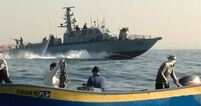
The Israeli occupation navy on Thursday fired live ammunition at Palestinian fishing boats in the northern waters of Gaza off the shore of Beit Lahia, with no reported casualties.
Head of the fishermen committees Zakariya Bakr said that Israeli gunboats chased in the morning fishing boats off the coast of Beit Lahia, north of Gaza, amid intensive machinegun fire.
Bakr added that naval forces also fired three projectiles into the sea near some fishing boats, forcing them to go ashore.
Luckily, none of the fishermen was hurt in the attack.
In recent days, the Israeli navy escalated its attacks on Palestinian fishermen in Gaza waters.
Head of the fishermen committees Zakariya Bakr said that Israeli gunboats chased in the morning fishing boats off the coast of Beit Lahia, north of Gaza, amid intensive machinegun fire.
Bakr added that naval forces also fired three projectiles into the sea near some fishing boats, forcing them to go ashore.
Luckily, none of the fishermen was hurt in the attack.
In recent days, the Israeli navy escalated its attacks on Palestinian fishermen in Gaza waters.
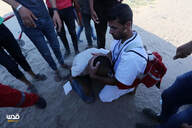
A number of Palestinian citizens were injured on Wednesday when the Israeli occupation forces opened fire at peaceful protesters marching against the Bahrain conference near Gaza border.
The PIC reporter said that five Palestinian youths were shot and injured east of Khan Yunis and al-Bureij in the southern and middle areas of the Gaza Strip.
On Tuesday 14 Palestinian demonstrators were injured in a similar march on Gaza border east of Khan Yunis.
On the same day a US-led economic workshop in the Bahraini capital of Manama kicked off under the name "Peace to Prosperity" as a first step toward achieving the US peace plan in the Middle East, which is known as the "Deal of the Century".
The Bahrain conference was completely rejected by the Palestinian Authority. Egypt, Jordan, Morocco, Saudi Arabia, United Arab Emirates, Oman and Qatar took part in the workshop amid widespread condemnation.
The PIC reporter said that five Palestinian youths were shot and injured east of Khan Yunis and al-Bureij in the southern and middle areas of the Gaza Strip.
On Tuesday 14 Palestinian demonstrators were injured in a similar march on Gaza border east of Khan Yunis.
On the same day a US-led economic workshop in the Bahraini capital of Manama kicked off under the name "Peace to Prosperity" as a first step toward achieving the US peace plan in the Middle East, which is known as the "Deal of the Century".
The Bahrain conference was completely rejected by the Palestinian Authority. Egypt, Jordan, Morocco, Saudi Arabia, United Arab Emirates, Oman and Qatar took part in the workshop amid widespread condemnation.
26 june 2019
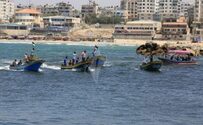
Israeli navy ship attacked, late on Tuesday at night, Palestinian fishing boats in Gaza territorial waters, close to the shore in Rafah, in the southern part of the Gaza Strip, before ramming one of the boats and crashing it, wounding one fisherman, and later opened fire other boats, causing damage, before abducting three.
Zakariya Abu Bakr, the coordinator of the Palestinian Fishermen’s Syndicate, said one of the navy ships chased and rammed into a Palestinian fishing boat, damaging it and wounding one fisherman, identified as Mohammad Nahhal.
Palestinian fishermen managed to rescue the wounded fisherman, before he was rushed to Abu Yousef Najjar hospital, in Rafah, and towed his boat back to the shore.
Abu Bakr added that the navy also abducted one fisherman, identified as Hazem an-Nada, before other fishermen towed his boat back to the shore.
Shortly afterwards, the navy fired many live rounds at another fishing boat, causing damage to its motor, before abducting two fishermen, who were onboard, identified as Mohammad Nidal Ayyash and Mos’ab Nidal Ayyash.
Zakariya Abu Bakr, the coordinator of the Palestinian Fishermen’s Syndicate, said one of the navy ships chased and rammed into a Palestinian fishing boat, damaging it and wounding one fisherman, identified as Mohammad Nahhal.
Palestinian fishermen managed to rescue the wounded fisherman, before he was rushed to Abu Yousef Najjar hospital, in Rafah, and towed his boat back to the shore.
Abu Bakr added that the navy also abducted one fisherman, identified as Hazem an-Nada, before other fishermen towed his boat back to the shore.
Shortly afterwards, the navy fired many live rounds at another fishing boat, causing damage to its motor, before abducting two fishermen, who were onboard, identified as Mohammad Nidal Ayyash and Mos’ab Nidal Ayyash.
21 june 2019
|
|
Israeli forces have once again opened fire on Palestinians taking part in the 63rd Friday of the peaceful “Great March of Return” protests, along the separation fence between the besieged Gaza Strip and occupied territories, injuring at least 79 peaceful protesters.
According to Days of Palestine, the Ministry of Health reported that 79 citizens have been injured. It stated that, in the course of the year following the start of the protests, in March 2018, the Israeli army killed 277 Palestinians, including 52 children. The vast majority of these people were murdered in cold blood during the massive, unarmed popular protests that took place along the boundary line between Gaza and Israel. Almost without fail, the protesters have returned every week, time and again, since then, to protest against Israel’s crimes. |
What is more, the protests are for the Right of Return – the non-negotiable predicate of the Palestinian liberation struggle. And, they are more than merely symbolic; they are marching for a real return to their homelands, as is their legitimate right.
Page: 27 - 26 - 25 - 24 - 23 - 22 - 21 - 20 - 19 - 18 - 17 - 16 - 15 - 14 - 13 - 12 - 11 - 10 - 9 - 8 - 7 - 6
Truce violations List of names Pictures of martyrs
Days: Aug: 26 - 25 - 24 - 23 - 22 - 21 - 20 - 19 - 18 - 17 - 16 - 15 - 14 - 13 - 12 - 11 - 10 - 9 - 8 - 7 - 6 - 5 - 4 - 3 - 2 - 1
July: 31 - 30 - 29 - 28 - 27 - 26 - 25 - 24 - 23 - 22 - 21 - 20 - 19 - 18 - 17 - 16 - 15 - 14 - 13 - 12 - 11 - 10 - 9 - 8
